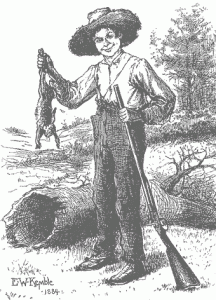Huckleberry Finn: Satire
In the first few chapters of Huckleberry Finn, Mark Twain satirizes religion. He uses juxtaposition, metaphor, hyperbole, and irony to create the satire. He compares religion to superstition, praying to wishing, and God to a genie. Twain portrays Huck as a philosophical young boy who doesn’t accept new ideas without first questioning them. This shows the author’s tone towards religion to be critical and questioning about its impracticalities.

Religion is compared to superstition throughout the book. Twain plays off of the fact that as humans we all have a need to believe in something. Even those that believe in nothing essentially believe in that which tells them that there is nothing to believe in. In the first chapter, the Widow Douglas and her sister, Miss Watson, assumed the place of caretakers of Huck and decided they were going to “civilize” him.
Order custom essay Huckleberry Finn: Satire with free plagiarism report
 450+ experts on 30 subjects
450+ experts on 30 subjects
 Starting from 3 hours delivery
Starting from 3 hours delivery
They put him in fresh clothes and taught him how to read and write and began to impose their religious beliefs on him. He didn’t seem too impressed, especially when the widow told him about Moses and tells his audience that, “by-and-by she let out that Moses had been dead for a considerable long time; so then I didn’t care no more about him; because I don’t take no stock in dead people.”(pg. 2) He disliked getting all riled up over someone that was dead because he didn’t understand how this man was of any use to anyone if he wasn’t alive anymore.
When the idea of heaven and hell is introduced, Huck simply states that he wants a change of scenery and that he wasn’t particular as to where he ended up as long as he ended up with Tom. Miss Watson told him about “the good place”, in other words “heaven”, and he, “couldn’t see no advantage in going where she was going” but he kept it to himself so as not to cause himself more trouble. Huck doesn’t see any real benefit in believing in what he can only perceive as stories. He has more faith in friendship and loyalty, which is evident when he comments that he wants to go wherever it is that Tom ends up.
To juxtapose praying and wishing, Twain uses irony to head his argument. Miss Watson took Huck into the closet to pray, but he sees no good coming from it. She told him to pray everyday and that in return he would get whatever he wanted. Huck finds the flaw in this explanation when he finds himself in need of fishing hooks. He tells the reader that he, “tried for the hooks three or four times, but somehow I couldn’t make it work.”(pg. 9)
He finds it ironic that an all-powerful being like God, in all His glory as Miss Watson paints Him, cannot give Huck a simple hook for his fishing line. When he goes to her for help as to why his prayers aren’t working, Miss Watson said he was a “fool”. Huck, being the questioning child that he is, goes into the woods to think about it. He doesn’t understand how people don’t get back money that they have lost, or objects that have been stolen, or even gain some healthy weight if they should supposedly be able to get it from simply praying.
Miss Watson told him that the things someone could get from praying were “spiritual gifts” and he decides that these so called “gifts” are of no use to him. Later on he is told that he shouldn’t be asking for anything in the first place, that he should be helping and worrying about others instead. This again makes no sense because this doesn’t benefit him, only those who receive help from him. These concepts of religion are too abstract for Huck to understand and he no longer gives them anymore thought.
Twain uses Huck’s questioning character to conspicuously ingrain questions in the reader’s minds. What is the difference between religion and superstition? Why is one held so high and the other thought of as child’s play? Why does praying work the way it does? The list goes on. Twain uses Huck to make his audience ponder the same questions and follow Huck through his observations, deductions, and conclusions. Huck is a child and sees everything in its simplest form.
All the abstract concepts and useless explanations make no sense to him and therefore he simply throws them to the wind and doesn’t give them another thought. In the end, Twain also makes fun of religion, this belief with all its stability and faith; yet when thought about and truly questioned, its basis is weak. This seems to be Twain’s purpose in satirizing religion. To show just how feeble-minded we are to need such strange beliefs in order to exist in the first place.
Cite this Page
Huckleberry Finn: Satire. (2018, Sep 04). Retrieved from https://phdessay.com/satire-in-huck-finn/
Run a free check or have your essay done for you


